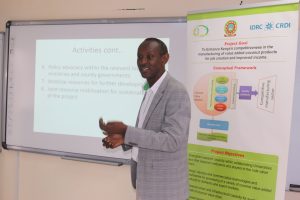Jomo Kenyatta University of Agriculture & Technology Researchers Turn the Manufacturing Tide in Coconut Value Chains

The National Research Chair for Manufacturing on technological innovations for quality and productivity in the coconut value added products domiciled at Jomo Kenyatta University of Agriculture and Technology (JKUAT) has achieved several success milestones, according to the latest project status report.
The Research Chair programme is supported by the Canadian International Development Research Centre (IDRC) through the National Commission for Science, Technology and Innovation (NACOSTI).
Manufacturing Research Chair project is focused on efforts aimed at unlocking the great potential of the coconut crop and impact the economies of the small scale enterprises particularly at the Kenyan Coast.
According to the project experts, the achievements so far realized are steadily turning the tide of manufacturing agenda in the country’s coconut crop sub-sector, estimated to have an unexploited potential worth Ksh. 12 billion.
However, over the years, the sub-sector has received very little attention to spur the coconut value chains at the Kenyan coast.
Researchers implementing the project drawn from JKUAT, Moi and Multimedia universities, have among other successes, developed and deployed various low-cost-gender-sensitive technologies.
The technologies include “the coconut dehusker, the stirrer, the briquetting machine, which have been distributed in Kilifi, Mombasa and Kwale counties to help SMEs in the coconut value chains to upscale quality production. The team is currently fine-tuning a decorticating machine.”
The Research Chair holder, Prof. Bernard Ikua made these revelations in his annual report during the fourth technical advisory committee (TAC) meeting convened, July 29, 2022 to shine a spotlight on the progress made by the Manufacturing Research Chair project.
The manufacturing research experts have also published a couple of “research findings in refereed journals, authored book chapters tackling various aspects of the coconut value chains, thus contributing to the body of knowledge on the sub sector.”
The 5-year-research project has further trained SMEs at the coast on product standardization, book-keeping, marketing and branding and supported a number of postgraduate students who have done studies on the coconut value chains; developed innovative food and beverage products such as coconut ice cream that is set to be released soon.
The Manufacturing Research Chair is the second in Kenya, and is mandated “to enhance Kenya’s competitiveness in manufacturing value added coconut products for job creation and improved income.”
Addressing the stakeholders, Deputy Director of Industry, State Department for Industrialization, Ms. Hannah Kiarie, underscored the importance of commercialization in job and wealth creation through setting up of industries, noting, this will ease the current hue and cry over unemployment in the country.
She lauded JKUAT for her efforts in championing innovations that offer solutions to the coconut sub-sector and urged the university to explore existing opportunities under the Kenya Industry and Entrepreneurship Project (KIEP), a US$50 million initiative implemented by the Ministry of Industry and Trade with support from the World Bank.
KIEP aims to strengthen innovation and entrepreneurship ecosystem in Kenya through building capacity of incubators, accelerators as well as bridging technical skills gaps in the market by linking young talent and academia to the private sector.
In her statement, the JKUAT Vice Chancellor, Prof. Victoria Wambui Ngumi stated that the overall goal of the Manufacturing Research project is “to enhance Kenya’s competitiveness in manufacturing value added coconut products for job creation and improved income.”
The Vice Chancellor who was represented by the Deputy Vice Chancellor in charge of Academic Affairs, Prof. Robert Kinyua, characterized the country’s manufacturing sector as one of the critical sectors that hold the key to the attainment of Kenya Vision 2030, the Big Four Agenda, as well as the actualization of the Government policies on job creation, value addition and export substitution among others.
The achievement of the stated objectives, she said, has partly been hampered by “poor performance of the manufacturing sector which has been attributed to low capital injection, use of obsolete technologies, inadequate raw materials and the high cost of production.”
The Vice Chancellor encouraged the research team to come up with “sustainable solutions to address the challenges impeding SMEs from realizing their full potential.”
She further challenged them to leverage on synergy and identify existing policy gaps in the manufacturing sector with the input of the Social Economics experts and draft policy papers that “propose policy interventions to address challenges facing Manufacturing especially in the context of the country’s coconut sub-sector.”
The Vice Chancellor acknowledged the great support from the IDRC and NACOSTI for believing in the vision of JKUAT through the Manufacturing Research team and appreciated the contribution of researchers from Moi University, Multimedia University and JKUAT towards the transformation of peoples’ lives, the coconut sub-sector and the country’s economy at large.
She appealed to the Coastal county governments of Kwale, Kilifi and Mombasa to be part of the initiative aimed at benefiting the SMEs in the Coconut value chains.
In his submission, Mr. Teddy Yawa of NOCD, thanked the research team for developing new technologies for the SMEs, a situation he noted would impact the subsector. He challenged the researchers to develop an innovation to help coconut farmers to harvest the coconut fruits.
Stream leaders – Prof. Willy Muturi, Prof. Daniel Sila, Prof. John Githaiga, Dr. Catherine Ngamau, Dr. Walyambillah Waudo, and Dr. Hiram Ndiritu, made presentations in their respective research themes, namely, Socio Economics and Policy, Food and Beverages, Textile and Fibre, Biomass and Energy, Beauty and Cosmetics, as well as Tooling and Machineries.
The meeting was also addressed by Dr. Patrick Mbindyo, (Research, Production and Extension), Dr. Shohei Aoki (Africa-ai-Japan project), Eng. Benson Kariuki (Directorate of Intellectual Property).




